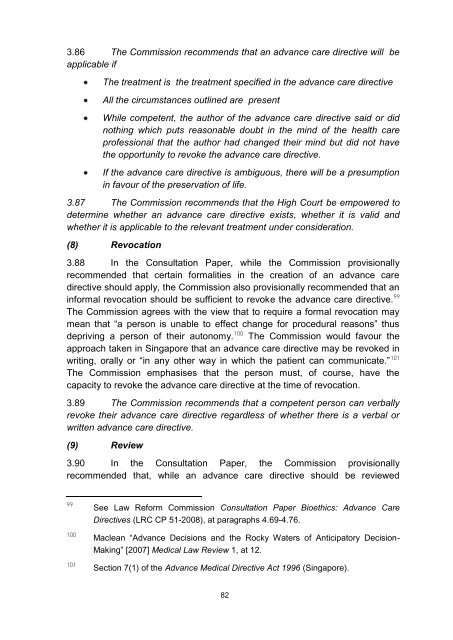Report on Bioethics: Advance Care Directives - Law Reform ...
Report on Bioethics: Advance Care Directives - Law Reform ...
Report on Bioethics: Advance Care Directives - Law Reform ...
Create successful ePaper yourself
Turn your PDF publications into a flip-book with our unique Google optimized e-Paper software.
3.86 The Commissi<strong>on</strong> recommends that an advance care directive will beapplicable ifThe treatment is the treatment specified in the advance care directiveAll the circumstances outlined are presentWhile competent, the author of the advance care directive said or didnothing which puts reas<strong>on</strong>able doubt in the mind of the health careprofessi<strong>on</strong>al that the author had changed their mind but did not havethe opportunity to revoke the advance care directive.If the advance care directive is ambiguous, there will be a presumpti<strong>on</strong>in favour of the preservati<strong>on</strong> of life.3.87 The Commissi<strong>on</strong> recommends that the High Court be empowered todetermine whether an advance care directive exists, whether it is valid andwhether it is applicable to the relevant treatment under c<strong>on</strong>siderati<strong>on</strong>.(8) Revocati<strong>on</strong>3.88 In the C<strong>on</strong>sultati<strong>on</strong> Paper, while the Commissi<strong>on</strong> provisi<strong>on</strong>allyrecommended that certain formalities in the creati<strong>on</strong> of an advance caredirective should apply, the Commissi<strong>on</strong> also provisi<strong>on</strong>ally recommended that aninformal revocati<strong>on</strong> should be sufficient to revoke the advance care directive. 99The Commissi<strong>on</strong> agrees with the view that to require a formal revocati<strong>on</strong> maymean that ―a pers<strong>on</strong> is unable to effect change for procedural reas<strong>on</strong>s‖ thusdepriving a pers<strong>on</strong> of their aut<strong>on</strong>omy. 100 The Commissi<strong>on</strong> would favour theapproach taken in Singapore that an advance care directive may be revoked inwriting, orally or ―in any other way in which the patient can communicate.‖ 101The Commissi<strong>on</strong> emphasises that the pers<strong>on</strong> must, of course, have thecapacity to revoke the advance care directive at the time of revocati<strong>on</strong>.3.89 The Commissi<strong>on</strong> recommends that a competent pers<strong>on</strong> can verballyrevoke their advance care directive regardless of whether there is a verbal orwritten advance care directive.(9) Review3.90 In the C<strong>on</strong>sultati<strong>on</strong> Paper, the Commissi<strong>on</strong> provisi<strong>on</strong>allyrecommended that, while an advance care directive should be reviewed99100101See <strong>Law</strong> <strong>Reform</strong> Commissi<strong>on</strong> C<strong>on</strong>sultati<strong>on</strong> Paper <strong>Bioethics</strong>: <strong>Advance</strong> <strong>Care</strong><strong>Directives</strong> (LRC CP 51-2008), at paragraphs 4.69-4.76.Maclean ―<strong>Advance</strong> Decisi<strong>on</strong>s and the Rocky Waters of Anticipatory Decisi<strong>on</strong>-Making‖ [2007] Medical <strong>Law</strong> Review 1, at 12.Secti<strong>on</strong> 7(1) of the <strong>Advance</strong> Medical Directive Act 1996 (Singapore).82
















